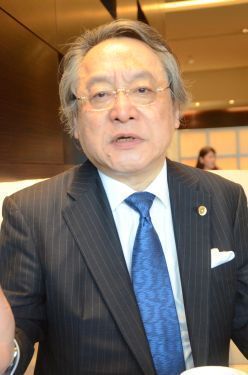Constitutional scholar says central government obligated to pursue relocation outside Okinawa

Setsu Kobayashi is a lawyer and professor emeritus of Anglo-American Common Law and the Constitution at Keio University. Kobayashi attended the House of Representatives Commission on the Constitution in June 2015 to discuss legislation relating to the Japan-U.S. security treaty. At the time he claimed that the legislation, which reinterpreted passages about operations of the Japanese military, was "unconstitutional."
February 28, 2019 Ryukyu Shimpo
On February 27 the constitutional scholar and professor emeritus at Keio University, Setsu Kobayashi, spoke with the Ryukyu Shimpo about the results of the prefectural referendum on February 24 which asked Okinawans to vote “yes,” “no,” or “neither yes nor no” to land reclamation work as part of construction of the Futenma Replacement Facility in Henoko, Nago City.
Approximately 70 percent of all votes cast were “no” votes against the land reclamation work.
Kobayashi said, “A prefectural referendum is constitutionally binding.
In accordance with the intent of the Constitution the [central] government is obligated to pursue ‘relocation outside of the prefecture, at least.'”
Kobayashi based this on Article 95 of the Constitution.
The text of this article establishes that, “A special law, applicable only to one local public entity, cannot be enacted by the Diet without the consent of the majority of the voters of the local public entity concerned, obtained in accordance with law.” Furthermore, he pointed out that the referendum clearly demonstrates that Futenma Air Station’s relocation to Henoko has not earned agreement from a majority of Okinawans.
Noting that Article 95 refers to a “law,” Kobayashi explained that, “Although the relocation of the U.S. military facility to Henoko is not a ‘law’ in form, given that the Constitution intends to disallow the central government from bullying a region, the purpose of Article 95 is to provide a standard preventing the government from forcing an overlarge share of the [base] burden on Okinawa.”
Some doubt that opposition to land reclamation is truly the will of the Okinawan people.
Reasons indicated include that voter turnout only reached about half of the electorate, and the fact that there were approximately 700,000 Okinawan people who did not specifically cast a “no” vote.
Kobayashi refuted this, saying, “In the previous House of Representatives election in single-member districts, the LDP only got 47 percent of the votes, which accounted for about 25 percent of all eligible voters in those districts.
Nevertheless, the LDP acquired about 74 percent of the seats. It is hypocritical for the Abe administration to cite a low turnout rate in the prefectural referendum [as its reason to dismiss the results].”
Furthermore, Kobayashi voiced his opinion that the argument of low turnout is not applicable to the matter at hand.
He said, “The proportion of no votes to land relcamation in the prefectural referendum is overwhelmingly high compared to that of the LDP [votes in the aforementioned example].
It is a legal principle that those who abstain from voting abide by the outcomes wrought by those who turn out to vote.”
(English translation by T&CT and Erin Jones)
Previous Article:Jinshiro Motoyama of referendum council advises government to heed Okinawans’ wishes
Next Article:“Lobbying Journal” detailing the “beggars’ march” is published
[Similar Articles]
- Over 72 percent of respondents vote “no” to land reclamation in prefectural referendum, more than one-fourth of all registered voters in Okinawa
- Okinawa poll finds 67.6 percent plan “no” vote in land reclamation referendum, greatly exceeding planned “yes” and “neither” votes
- Constitutional scholar Setsu Kobayashi: Henoko base construction is flagrant constitutional violation
- Camp Schwab rally of 3,000 calls for “no” votes to land reclamation in prefectural referendum
- Okinawa poll shows solid majority intends to attend land reclamation referendum, desires availability in all municipalities
 Webcam(Kokusai Street)
Webcam(Kokusai Street)


